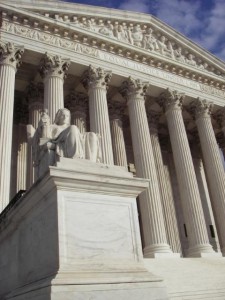 Reversing the First Circuit Court of Appeals, the Supreme Court has held, in Lawson v. FMR (pdf), that the SOX whistleblower protection provisions set forth in 18 U.S.C. §1514A protect the employees of private companies that contract with public companies that are directly covered by the Act. The decision is consistent with that of the Administrative Review Board in Spinner v. David Landau & Associates (ARB May 30, 2012), which similarly held that the whistleblower provision protects the employees of privately-held contractors and sub-contractors of publicly-held companies. The First Circuit in Lawson had rejected that interpretation of the Act.
Reversing the First Circuit Court of Appeals, the Supreme Court has held, in Lawson v. FMR (pdf), that the SOX whistleblower protection provisions set forth in 18 U.S.C. §1514A protect the employees of private companies that contract with public companies that are directly covered by the Act. The decision is consistent with that of the Administrative Review Board in Spinner v. David Landau & Associates (ARB May 30, 2012), which similarly held that the whistleblower provision protects the employees of privately-held contractors and sub-contractors of publicly-held companies. The First Circuit in Lawson had rejected that interpretation of the Act.
The case was brought by former employees of a private company that contracted to be the investment manager of and advisor to publicly-traded mutual funds that had no employees of their own. The issue, in a nutshell, was this: can an employee who works for a private company that is not directly covered by SOX nevertheless file a whistleblower retaliation claim against her employer when that employer is a contractor to a public, SOX-covered employer; or as the Court put it:
Does §1514A shield only those employed by the public company itself, or does it shield as well employees of privately held contractors and subcontractors—for example, investment advisers, law firms, accounting enterprises— who perform work for the public company?
The statutory text at issue is as follows:
No [public] company . . . , or any officer, employee, contractor, subcontractor, or agent of such company, may discharge, demote, suspend, threaten, harass, or in any other manner discriminate against an employee in the terms and conditions of employment because of any lawful act done by the employee . . . to provide information, cause information to be provided, or otherwise assist in an investigation regarding any conduct which the employee reasonably believes constitutes a violation of section 1341 [mail fraud], 1343 [wire fraud], 1344 [bank fraud], or 1348 [securities or commodities fraud], any rule or regulation of the Securities and Exchange Commission, or any provision of Federal law relating to fraud against shareholders. [emphasis added]
The language requiring interpretation was the highlighted term “an employee;” specifically, whether it is limited to the employees of the public company or refers to employees of the contractors or subcontractors as well. Justice Ginsburg, writing for the majority, held that Section 1514A “shelters employees of private contractors and subcontractors, just as it shelters employees of the public company served by the contractors and subcontractors.” She was joined by the Chief Justice and Justices Breyer and Kagan. Justices Scalia and Thomas joined in principal part, while Justice Sotomayor, joined by Justices Kennedy and Alito, dissented.
The majority decision rested primarily on the view that the narrower reading impermissibly requires the unsupported interpolation of the phrase “of a public company” after “an employee.” The majority also noted that “[c]ontractors are not ordinarily positioned to take adverse action against employees of the public company with whom they contract,” such that the reference to “an employee” logically must include the contractor’s own employees. The majority also rejected reliance on the statutory heading in the statute, “Protection for Employees of Publicly Traded Companies Who Provide Evidence of Fraud” (emphasis added), as evidence of Congressional intent.
The dissent’s view was that Section 1514A is far more ambiguous than the majority recognizes, particularly in light of the statute’s headings, and that the Court’s broad interpretation leads to “absurd results” because it means, for example, that the household employees of employees of public companies are protected by SOX. The majority found this to be a “theoretical” rather than realistic concern.
In sum, the 6-3 holding by a majority comprised of both liberals and conservatives that SOX protects employees of private contractors when they report covered forms of fraud, thus giving an expansive reading of the scope of coverage of the Act, seems to be another inevitable win for whistleblowers in a post-Enron world.
Blog Editors
Authors
- Member of the Firm
